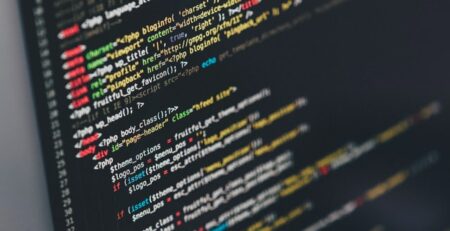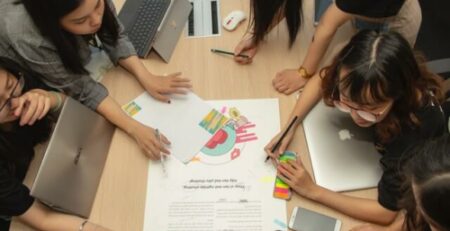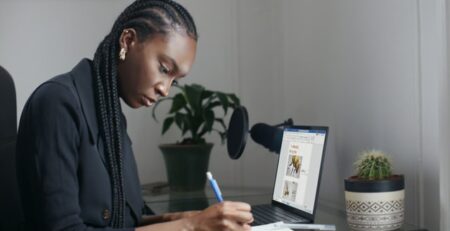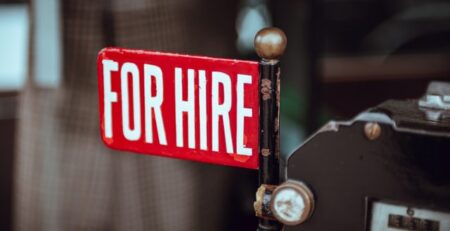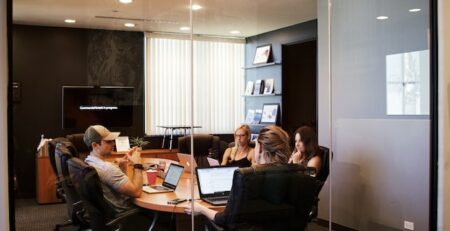How To Hire a UX Designer For A Startup
Hiring a UX designer is a pivotal decision for any startup aiming to foster a product-centric approach that greatly resonates with its user base. As startups generally operate within limited budgets and dynamic environments, bringing in a UX designer who not only aligns with your company’s vision but also has the ability to execute on that vision, is crucial. The role of a UX designer transcends mere appearance by enhancing user satisfaction through improving the usability, accessibility, and pleasurable interaction between the customer and the product. This involves understanding user behaviors, needs, and motivations through various feedback channels and design iterations, leading to a refined product that speaks directly to user desires and issues.
Before you begin the hiring process, it’s essential to understand the UX designer’s impact on your business outcomes. These professionals help bridge the gap between your user’s needs and the business’s objectives, crucial for a startup looking to make its mark in a competitive field. In drafting a job description for a UX designer, emphasize not only technical skills like wireframing, prototyping, user testing, and familiarity with design tools but also soft skills such as communication, problem-solving abilities, and empathy towards users. The integration of such soft skills ensures that the UX designer can collaborate effectively within multidisciplinary teams to create designs that align with both user needs and business goals.
The selection process should involve a combination of portfolio reviews, practical assessments, and behavioral interviews. An impressive portfolio showcases their design prowess and clarity of thought; however, problem-solving tasks can help illuminate their thought process and willingness to adapt to different scenarios, which is particularly important in a startup’s fast-paced environment. Behavioral interviews, on the other hand, can gauge cultural fit and the ability to mesh with existing workflows and company ethos. Offering an attractive package tailored to the unique needs and realities of startups—such as equity in the company, flexible work hours, and professional growth opportunities—is crucial to attract top talents who might otherwise opt for established companies. Through a careful hiring process, startups can ensure they select a UX designer who not only enhances the user experience but drives the business forward.
Most Asked Questions About Hiring a UX Designer for a Startup
- What are the core skills and qualifications to look for in a UX designer?
- How can I assess a UX designer’s ability during the interview process?
- What compensation should I offer to a UX designer in a startup?
- How do I determine if a UX designer is a good fit for my startup’s culture?
- What are the best practices for onboarding a new UX designer in a startup?
What are the core skills and qualifications to look for in a UX designer?
Finding the right UX designer for your startup involves a keen look at both tangible and intangible skills that will benefit your team and product. Primary among them are technical skills such as proficiency in various design tools like Sketch, Adobe XD, Figma, and InVision. Experience in creating wireframes, user flows, and interactive prototypes is also a must. The designer should possess a strong understanding of user-centered design principles and accessibility standards to ensure the product is usable for all target users. Beyond technical skills, the right UX designer for a startup needs to be adaptable and have excellent problem-solving skills. They should be able to work in agile environments and manage the iterative nature of design processes in startups. This flexibility often leads to innovative solutions tailored for unique user needs that a startup specifically targets. Another important qualification is experience with user research and the ability to translate user data into actionable design decisions. This involves not just gathering data but also interpreting it effectively to make informed choices that enhance the user experience. As startups often need to pivot based on market feedback, a UX designer skilled in research will be invaluable. Interpersonal and communication skills cannot be underrated. UX designers must communicate their design concepts clearly to both technical and non-technical team members. They need to justify design choices and how these decisions align with business objectives effectively. This alignment ensures that the implemented designs drive user engagement and satisfaction. Lastly, a passion for learning and personal growth aligns well with the dynamic needs of a startup. UX design is an ever-evolving field, and keeping abreast of the latest design trends, tools, and technologies is crucial. A designer’s willingness to learn and adapt can be just as important as their current skills.
How can I assess a UX designer’s ability during the interview process?
Effective assessment of a UX designer during the interview process can be achieved through a combination of portfolio review, practical tasks, and behavioral questions. Initially, the designer’s portfolio provides the first layer of insight into their professional capabilities, showcasing their past projects and the design processes they followed. A well-regulated practical task or design challenge relevant to your product can further illuminate a candidate’s problem-solving skills and creativity. Such tasks should be designed to mimic real-world problems that the designer would face while working at your startup. It’s important these assessments are fair in scope and directly related to the daily responsibilities they will handle. Behavioral questions tailored to evaluate how the candidate has handled past work situations offer glimpses into their teamwork dynamics, leadership qualities, and ethical judgments. Questions could cover how they’ve dealt with deadline pressures, collaborated across different teams, and incorporated feedback into their design workflow. Furthermore, introducing role-specific scenarios during the interview can help assess a candidate’s thought process. For example, asking the designer how they would improve an existing feature of your product based on user feedback tests their ability to think critically and user-centered. Lastly, reference checks can be instrumental in validating the impressions and information gleaned from the interview process. Talking to previous employers or colleagues can provide additional context on the designer’s technical skills, work ethic, and ability to blend into different corporate cultures. For more detailed insight, Mastering Job Interviews: Essential Tips and Answers to Top Questions offers further reading on conducting effective interviews.

What compensation should I offer to a UX designer in a startup?
Determining the right compensation for a UX designer in a startup setting involves balancing budget constraints with competitive offerings to attract skilled talent. It’s important to recognize that compensation extends beyond salary and includes benefits, perks, and potentially equity options. The base salary should be competitive with industry standards, taking into account the designer’s level of experience, the complexity of the role, and geographic location. Research from sources such as the Bureau of Labor Statistics and industry-specific salary guides can provide baseline figures. Beyond monetary compensation, consider adding non-traditional benefits that are particularly appealing to creative professionals. Options such as flexible work schedules, remote work opportunities, and a budget for professional development can be very attractive. Equity is a common compensation component in startups, offering a portion of ownership in the company. This not only helps in managing upfront cash outlays but also aligns the designer’s interests with the long-term success of the business. It’s vital that any equity offer is made clear in terms of vesting schedule and percentage share. Lastly, ensure that the total compensation package is put together transparently and communicated clearly during the hiring process. A well-rounded offer that addresses both financial and personal growth aspects of a career can differentiate your startup from others vying for the same talent. To further explore competitive structures, refer to How to Know if Your Salary is Competitive.
How do I determine if a UX designer is a good fit for my startup’s culture?
Assessing whether a UX designer will mesh well with your startup’s culture involves several considerations. During the interview process, it’s crucial to explore the candidate’s values, work ethic, and their approach to collaboration and conflict resolution. Engage them in discussions about past experiences working in teams, handling stress and uncertainty, and their motivation for working in a startup environment. It’s also beneficial to involve various team members in the interview process to get multiple perspectives on the candidate’s interpersonal skills and compatibility with the team. Observing how the candidate interacts in a less formal setting, such as a team lunch, can also provide valuable insights into their personality and ability to integrate into the company’s culture. Additionally, it’s important to clearly communicate your startup’s mission, values, and expectations during the interview process. This transparency allows the candidate to self-assess their fit with your organization. For more strategies on assessing cultural fit, consider exploring Building Trust Between Managers and Employees, which provides further insights into fostering a cohesive team environment.
What are the best practices for onboarding a new UX designer in a startup?
Onboarding a new UX designer effectively is crucial for their success and integration into your startup. Best practices include a structured onboarding process that introduces the new hire to the team, company culture, and specific projects they will be working on. Begin with comprehensive orientation sessions that cover everything from HR policies to project management tools and internal communication protocols. Assign a mentor or buddy who can provide guidance and support as they navigate their new role. It’s also important to set clear, achievable goals and provide regular feedback in the first few months. This helps the new designer understand your expectations and how they can contribute to the team’s objectives. Additionally, encourage them to engage in social activities and informal gatherings with their colleagues to build relationships and integrate more smoothly into the team. For more detailed guidance on managing remote teams, which is increasingly relevant today, see Tips for Managing a Remote Work Force.
As a creative staffing agency dedicated to empowering startups with exceptional talent, we understand the transformative impact a skilled UX designer can have on a burgeoning business. Hiring the right UX designer involves a meticulous blend of assessing technical proficiency, cultural fit, and a candidate’s potential to grow alongside your startup. By focusing on a comprehensive hiring strategy that includes evaluating core skills, conducting insightful interviews, offering competitive compensation, and implementing effective onboarding practices, startups can significantly enhance their product offerings and overall user satisfaction. Remember, the investment in hiring a proficient UX designer not only elevates the user experience but also strategically positions your startup for long-term success in today’s competitive digital landscape. We encourage startups to embrace these practices to build a robust team that thrives on innovation and user-centric design.
In today’s competitive market, finding the right creative and marketing expert can be a challenge. But with icreatives, you’re in experienced hands. With 37 years in staffing and a track record of matching more than 10,000 employees to over 1,000 companies worldwide, we know how to connect you with the best. Plus, you only pay if you hire—there’s no risk, only results. Ready to find your perfect creative or marketing expert? HIRE WITH ICREATIVES today!


